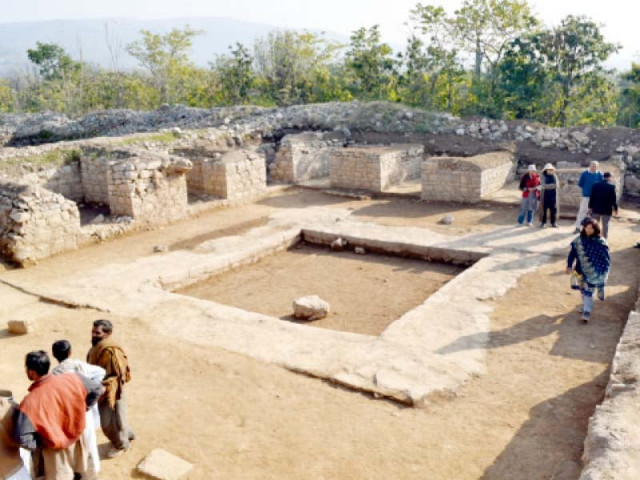Taxila valley: Badalpur discoveries open new chapters of history
Kushan artefacts from the 3rd Century discovered at Buddhist monastery

As many as eight coins and a key made of bronze, discovered during the excavation at the monastery. PHOTOS: EXPRESS
The initiative was carried out by the Taxila Institute of Asian Civilizations (TIAC). Dr Muhammad Ashraf Khan, director exploration at the Federal Department of Archaeology and Museums, conducted the excavation and preservation of the ancient site.
He unveiled as many as eight coins and a key made of bronze, discovered during the excavation at the monastery, referred to locally as Badalpur, situated 13 kilometres north-east of the Taxila Museum.
Among the discoveries was a seven-centimetre-long iron key, which is of the most interest for the current researcher. Khan said that earlier, iron keys were found at the metropolitan city of Sirkap.
Another discovery at the site was of a water condenser. According to Khan, this is the second such discovery in the Taxila valley in over a century. The only other such condenser is on display at the museum.
He said that a large number of pottery remains, bones and nails were also recovered during the excavations, and have been shifted to TIAC for in depth study.
The director said the discoveries in the valley not only open new chapters of history for archaeologists and researchers of Gandhara and Buddhism, but also attract more tourists to the area.

He said that the newly discovered water tank and as many as the cells of 12 monks will also be preserved. He said the water tank is different dozens of such tanks at Buddhist monasteries scattered in the valley, as it has large and unique huge pavements.
He said that this is third phase of excavations at the site by TIAC and this year the excavations were funded by National Fund for Cultural Heritage.
Sabina Younus, a scholar at TIAC, was part of the team which discovered the key. “Though a small object, it is as important as any other monument or artefact when it comes to filling the lapses of research,” she said, adding that “what a modern world considers a third-world country had once been the glory of civilization, a cradle of cultures and the development of common sense.”
Around 55 scholars are being imparted technical training at various sites across the country every year, according to a TIAC official.
Published in The Express Tribune, December 29th, 2015.



















COMMENTS
Comments are moderated and generally will be posted if they are on-topic and not abusive.
For more information, please see our Comments FAQ